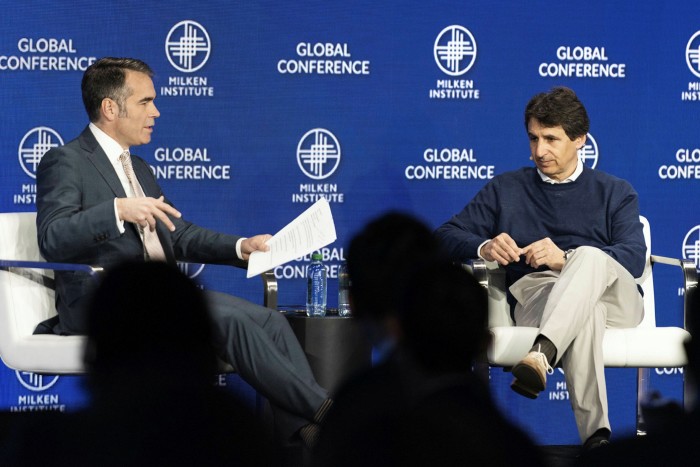[ad_1]
At 7am on Monday, Marc Rowan, chief executive of private equity group Apollo Global, took to the stage in Beverly Hills and warned his fellow financiers that a decade of almost uninterrupted buoyancy in financial markets was ending.
Stock markets would continue to fall, Rowan told the Milken Institute Global Conference, as surging inflation wreaks havoc on the global economy and the US Federal Reserve is forced to respond by raising interest rates.
“There is more of a correction to come,” said Rowan, whose firm manages $513bn in assets. “We are a long way from means and medians,” he said, referring to equity market valuations. “In the credit market, we also have a long way to go.”
It was a stark contrast to the mood just seven months earlier at the same venue, the Beverly Hilton, when dealmakers congregating for the Milken Institute’s October conference celebrated soaring financial markets and record corporate merger and private equity buyout activity.
Now, top executives at Apollo, Guggenheim and Bridgewater peppered their discussions with “recession”, “correction”, “a dark place”. It was reminiscent of the unease in 2008 when they could feel the music about to stop.
“We are coming out of the mother of all happy hours with negative interest rates and massive public spending supporting the economy and reducing risk,” said Mathieu Chabran, the co-founder of private capital group Tikehau Capital. “Now we are all dealing with a massive hangover.”
Investors can no longer count on ever-rising stock market multiples to drive their profits. Lenders, meanwhile, are poised to reduce an unprecedented flow of cash available to finance corporate takeovers as credit conditions tighten.

Much of the pessimism stems from events few dealmakers could have predicted, such as Russia’s invasion of Ukraine, which has caused energy and fertiliser prices to soar, leading to inflation that could put economies across Asia, Europe and Africa into recession and stall growth in the US.
With inflation well above a 2 per cent target, the Fed is increasing interest rates, a manoeuvre that many worry will lead to a recession.
“The Fed is going to have to be super aggressive,” said Scott Kleinman, co-president of Apollo. “They will trigger a recession before they allow inflation to run away.”
Bridgewater’s top strategist Rebecca Patterson, by contrast, warned of the threat of stagflation as global trade comes under fire. She said she left the IMF and World Bank spring meetings last month “in a dark place”.
The threat of a slowdown has already rocked the junk bond market, a critical source of funding for buyouts. Many attendees forecast a slowdown in leveraged buyouts as lenders pare back their exposures.
“It has an early-innings feel of a repricing of credit risk,” said Todd Lemkin, chief investment officer of Canyon Partners, who said bank risk committees are likely to be dialling back their financing commitments. “The party seems like it will stop, or pause, at least for a little bit.”

Private equity firms signalled a worry that the cash pouring into the buyout industry would slow.
As one prominent dealmaker noted, there are well over a dozen private equity firms trying to close new fundraisings of $15bn or more. At the same time, investors have marked down their public stock holdings drastically and at a far faster rate than their private portfolios, making them more overexposed to buyouts than ever. Apollo recently cautioned that its new private equity fundraising will take longer than previously expected to close.
Poolside, it did not look so bleak. At around midday on Monday, Leon Black, co-founder of Apollo Global, was eating a sandwich at a table with Nelson Peltz, the billionaire activist investor, and his lieutenant and son-in-law Ed Garden.
Financial industry titans such as Black and Peltz regularly make their way to Beverly Hills to attend the conference, hosted by junk bond pioneer Michael Milken, who made their careers during the go-go 1980s at investment bank Drexel Burnham Lambert.
Drexel went bankrupt in 1990 as Milken pleaded guilty to violating securities laws, but his financial innovation became an unstoppable force. Junk debt-financed takeovers, fuelled by an era of rock-bottom interest rates, are now a more than $4tn market.

On Wednesday, Milken and Howard Marks, the co-founder of Oaktree Capital, reminisced about old financings such as those for sewing-machine maker Singer and machinery giant International Harvester. The deals hark back to the last time inflation was surging and the Fed clipped investors’ “animal spirits.”
As the pair recalled the days just before a three decade-plus bull market in risky debt that made them both billionaires, Fed chair Jay Powell announced a 50 basis point increase in interest rates and signalled more rate hikes ahead.
Many of the younger attendees have never known such a market.
“If you are under 34 years old, you have never invested in your career in a rising rate environment or a down market environment,” said Apollo’s Kleinman. His boss Rowan said he carries a running joke inside the firm: “You’ve worked for me for 10 years and I still don’t know if you are a good investor.”
[ad_2]
Source link

